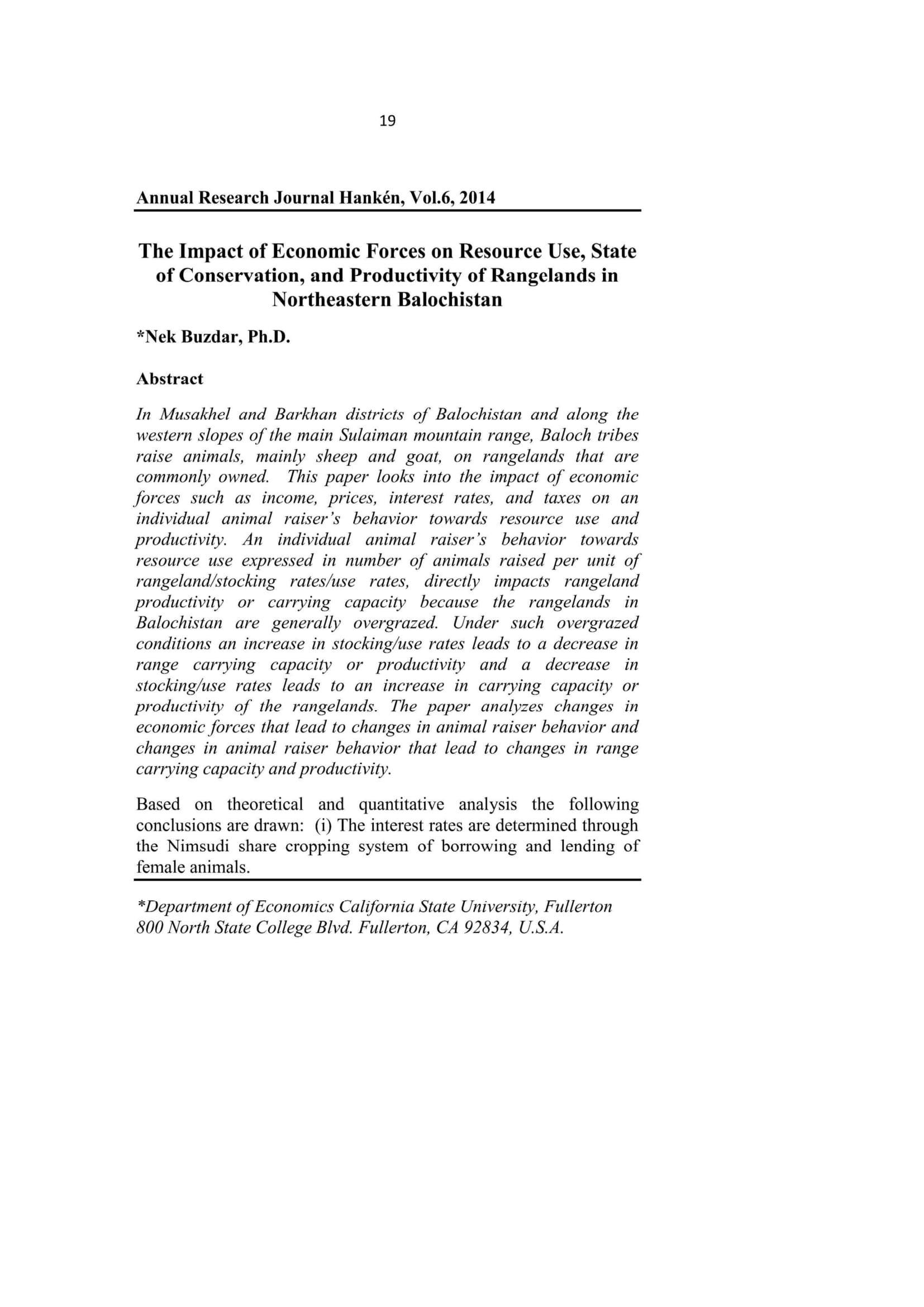The Impact of Economic Forces on Resource Use, State of Conservation, and Productivity of Rangelands in Northeastern Balochistan
Keywords:
Musakhel, Barkhan, Bijjar, NimsudiAbstract
In Musakhel and Barkhan districts of Balochistan and along the western slopes of the main
Sulaiman mountain range, Baloch tribes raise animals, mainly sheep and goat, on rangelands that are commonly owned. This paper looks into the impact of economic forces such as income, prices, interest rates, and taxes on an individual animal raiser’s behavior towards resource use and productivity. An individual animal raiser’s behavior towards resource use expressed in number of animals raised per unit of rangeland/stocking rates/use rates, directly impacts rangeland productivity or carrying capacity because the rangelands in Balochistan are generally overgrazed. Under such overgrazed conditions an increase in stocking/use rates leads to a decrease in range carrying capacity or productivity and a decrease in stocking/use rates leads to an increase in carrying capacity or productivity of the rangelands. The paper analyzes changes in economic forces that lead to changes in animal raiser behavior and changes in animal raiser behavior that lead to changes in range carrying capacity and productivity.
References
Ali, Zulfiqar (1966), Review of Range Mangement in Quetta/KALAT Region, paper read in West Pakistan Range Management Conference, Peshawar
Bhatti, M. Yaqoob (1970) Range Management in Balochistan, Directorate of aniomal Husbandary , Quetta, Balochistan, Pakistan.
Ciriacy-Wantrup, S.V. and Bishop, R.C. (1975). Common Property as a Concept in Natural Resource Policy”. Natural Resource Journal. 15, 713-727
Ciriacy-Wantrup, S.V. (1976). Resource Conservation, Economics and Policies. Division of Agricultural Sciences, University of California, 4th Printing.
Goodfellow, D.M. (1939). Principles of Economic Sociology, George Routledge and Sons Ltd. Broadway House, London.
Gray, James R. (1968). Ranch Economics. The Iowa University Press, Ames, Iowa.
North, D.C. ( 1990). Institutions, Institutional Change and Economic Performance. Cambridge University Press
Pehrson, Robert N. (1965). The social Organization of the Marri Baloch, Viking Fund Publications in Anthropology. No. 43 New York.
Salzman, C Philip (1972). Multi Resource Nomadism in Iranian Baluchistan” Journal of Asian and African studies Vol. VII No 1-2.
Salzman, C. Philip (1980) Process of Sedentarization Among the Nomads of Baluchistan. Praeger Scientific, New York, 1980
Salzman, C. Philip (1977). Ideology and Change in Middle Eastern Tribal Societies. Paper presented at the annual meeting of the American Anthropological Association, Houston, Texas.
Salzman, C. Philip (1976).“ Inequality and Oppression in a Nomadic Society: Pastoral Production and Society: Proceedings of the International Meeting on Nomadic Pastoralism, Paris, 1976
Sampson, Arthur W. Range and Pasture Management, John Wiley and Sons. Inc.
London 1923
Spooner, Brian A. (1967). Political and Religious Leadership in Persian Balochistan. Ph.D. Dissertation, Oxford University.
Stoddart L.A and Smith, A.D. (1943) Range Management, McGraw –Hill Book Company, Inc. New York
Swidler, W.W.(1972). Some Demographic Factors Regulating the Formation of Flocks and Camps Among the Brahvi of Balochistan, Perspectives on Noamdism, Leiden, Netherlands.
Swift, Jeremy (1979). Pastoral Development in Somalia- Herding cooperatives ad a Strategy Against Desertification and Famine” In: Glantz, M. (ed.) Desertification and Environmental degradation in and Around Arid Lands. Westview Press, Boulder, Colorado, 1979.
Ware, Helen (1979). Desertification and Population in Sub-Saharan Africa” In: Glantz, M. (ed.) Desertification and Environmental Degradation in and Around Arid Lands. Westview Press, Boulder, Colorado.


